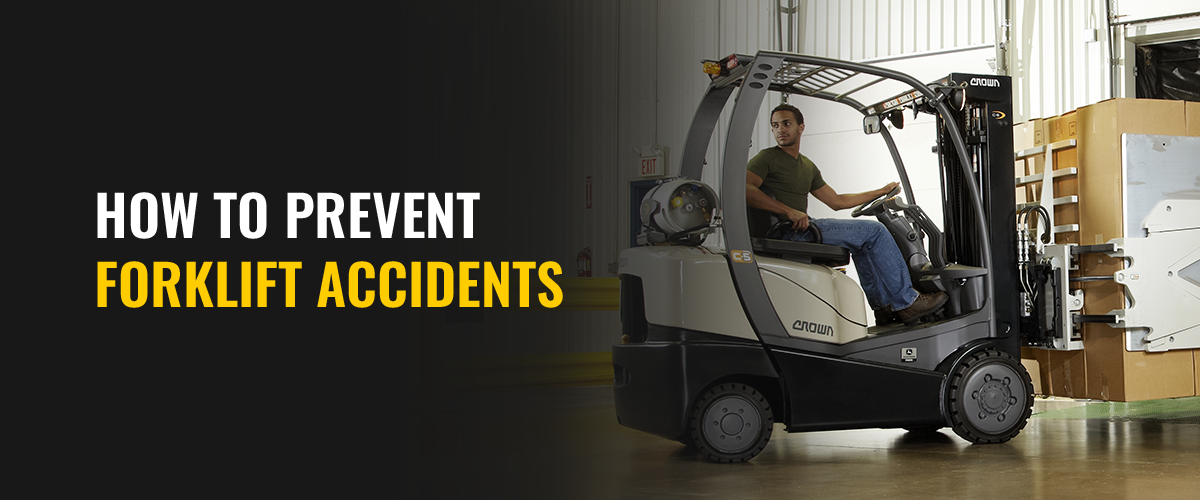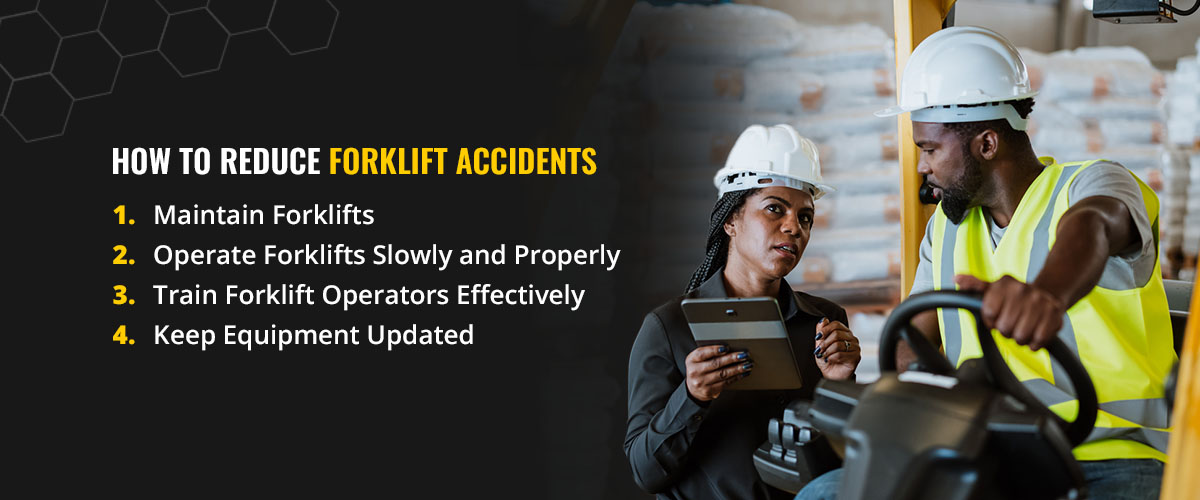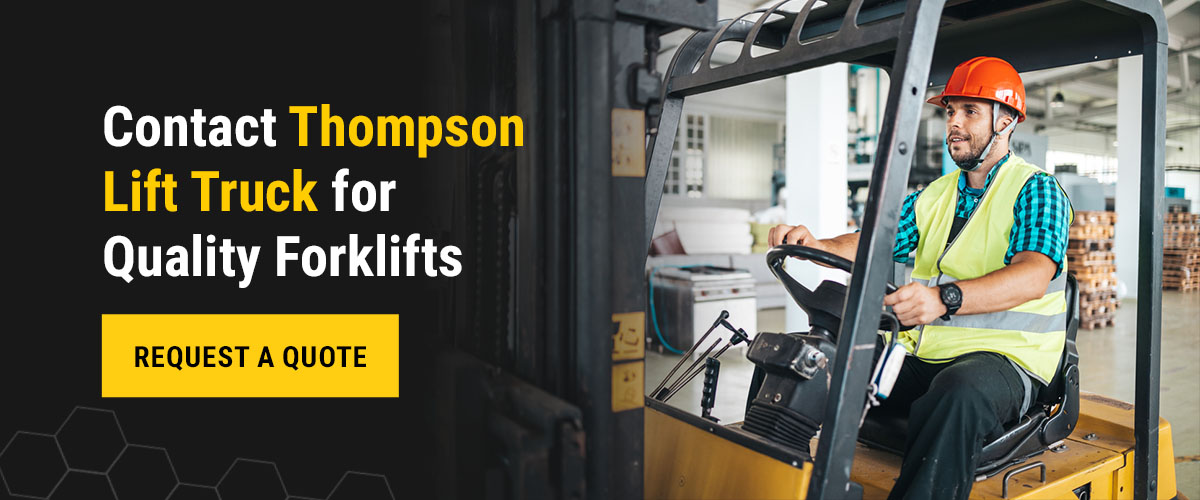
How to Prevent Forklift Accidents

Forklift accidents can cause serious injury, and safe operation is crucial for protecting employees. Forklift accidents often occur due to improper training, operator error, damaged or old equipment, improper loading, and excessive speed. You can improve workplace safety and prevent forklift accidents by training your employees effectively, using high-quality forklifts, maintaining your equipment, and enforcing safe operating practices.
How Many Accidents a Year Occur From Forklifts?
Thousands of forklift accidents occur each year due to several factors, and facilities file approximately 100,000 workers’ compensation claims for forklift accidents, reflecting the importance of prioritizing forklift safety in every work environment.
The Most Common Causes of Forklift Accidents
Forklift accidents typically occur because of the following reasons:
Lack of Inspections
Inspections are essential parts of forklift maintenance. Scheduling regular inspections increases safety by identifying potential damage before it causes accidents. You can repair or replace parts following an inspection to ensure operator safety. Inspections help you determine if you need to make repairs to prevent the following complications:
- Steering malfunction
- Brake malfunction
- Mast assembly malfunction
- Clutch or transmission malfunction
- Shift linkage malfunction
- Transmission or hydraulic system leaks
- Obstructions or blind spots in driver views
- Excessive emissions
- Poor display and control layout
- Inadequate or malfunctioning safety features
No Use of the Horn
Operating a forklift without a horn can lead to collisions and pedestrian accidents. Forklift operators should always use the horn in the following situations:
- Before moving through an intersection
- Any time there is a blind spot
- When forklifts are in close proximity to pedestrians
- When approaching an entrance or doorway
Pedestrians can unknowingly walk in a forklift’s path when operators neglect horn usage, and other forklift drivers can drive or back into another forklift when they are unaware of its presence. Horn usage is a crucial part of safe forklift operation.
Improper Training
Improper training is another common cause of forklift accidents. Operators learn crucial safety procedures and practices during training, so training must be thorough to prevent accidents.
The risk of accidents and injuries increases when employees receive improper training because it forces them to operate heavy machinery without the required knowledge to do so safely. Untrained or inadequately trained forklift operators may neglect important safety protocols, resulting in collisions, falls, or machine malfunctioning.
Old Equipment
Old equipment is more likely to malfunction than new equipment. Driving a forklift that has exceeded its life span is unsafe and can cause accidents or injuries. While inspections can help reduce malfunctions, an old forklift is still a hazard because its components can break down faster than a newer forklift’s parts. Replacing old forklifts with new ones is crucial for your team’s safety.
Excessive Speed
Excessive speed is a significant cause of forklift accidents. Driving too fast prevents an operator from stopping when they encounter another person or obstruction. Excessive speed also increases the risk of a forklift tipping over. An operator can potentially fall out of the forklift and become pinned underneath it if they take a turn too rapidly. Maintaining a proper forklift speed prevents collisions and tipping over.
Improper Loading
Unstable loads create hazards. An excessively heavy or improperly positioned load can cause imbalance and increase a forklift’s likelihood of tipping over or dropping a load on a nearby pedestrian. An unbalanced load can also obstruct a forklift operator’s vision or cause them to lose steering control, increasing the risk of a collision.
Practicing proper loading procedures and guidelines helps operators drive safely, see their surroundings clearly and keep pallets on the forklift while in motion. Operators should always ensure pallet loads are secure before driving a forklift.
Lack of Communication
Communication is important when operating a forklift, especially in a noisy environment. Poor communication can potentially lead to collisions. Forklift operators and pedestrians should always communicate to make each other aware of their presence. Proper communication helps individuals maintain a safe, clear path for forklifts and prevents accidents.
How to Reduce Forklift Accidents
Understanding how to prevent forklift accidents increases workplace safety. You can significantly reduce the risk of injury and death in your facility by following some important forklift operation safety procedures. Consider the following tips to prevent forklift accidents:
1. Maintain Forklifts
Maintaining your facility’s forklifts prevents machine malfunctions and helps keep your forklift operators and other employees safe. Operators or managers should examine forklifts for safety hazards daily if forklifts are only in use during the day or after each shift if your facility uses them day and night.
Creating a regular maintenance and service schedule ensures your forklifts remain in good condition and operate safely for as long as possible.
2. Operate Forklifts Slowly and Properly
Operate forklifts properly at all times, and maintain a safe speed. The Occupational Safety and Health Administration (OSHA) does not enforce a specific speed limit for forklifts, but it does provide the following factors to help determine a safe speed for your forklift:
- The type of forklift and its limitations
- Load weight
- Pedestrian traffic
- Facility surface conditions
- Adequate stopping distances
You can find your forklift’s limitations in the manufacturer’s manual. The American Society of Mechanical Engineers (ASME) also provides a stopping distance formula you can use to estimate safe stopping distances and then calculate a safe driving speed. It’s also important to stop at facility intersections, use the horn, and remain aware of surroundings at all times while operating a forklift.
3. Train Forklift Operators Effectively
Forklift accidents often occur due to operator error, but proper operator training can reduce collisions and other accidents. Enrolling your employees in an operator training course helps them develop the necessary knowledge and skills to operate a forklift safely. You can also enroll in a Train the Trainer course, which certifies your company to train employees correctly.
4. Keep Equipment Updated
Updated equipment is essential for safe operation. Industrial trucks operate safely when they are in good working condition, so you should maintain a proper forklift maintenance schedule to prevent machine malfunctions. Replacing forklifts is also crucial. Replace any old or damaged forklifts when they are past a point of repair. Purchasing new and high-quality forklifts ensures your employees operate safe machines.
Contact Thompson Lift Truck for Quality Forklifts
Forklift accident prevention depends on operator training, safe operation practices, effective communication, regular maintenance, and forklift condition. Purchasing new forklifts provides your employees with high-quality machines so they can complete tasks as safely as possible.
Thompson Lift Truck offers a wide selection of top-quality forklifts and maintenance services to ensure your equipment remains in the safest and most efficient condition. Request a quote to learn more and find the right forklift for your facility’s needs.


